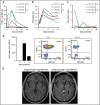CD19-directed CAR T-cell therapy for treatment of primary CNS lymphoma
- PMID: 34492703
- PMCID: PMC8945630
- DOI: 10.1182/bloodadvances.2020004106
CD19-directed CAR T-cell therapy for treatment of primary CNS lymphoma
Abstract
CD19-directed chimeric antigen receptor (CD19CAR) T-cell therapy has been successful in treating several B-cell lineage malignancies, including B-cell non-Hodgkin lymphoma (NHL). This modality has not yet been extended to NHL manifesting in the central nervous system (CNS), primarily as a result of concerns for potential toxicity. CD19CAR T cells administered IV are detectable in cerebrospinal fluid (CSF), suggesting that chimeric antigen receptor (CAR) T cells can migrate from the periphery into the CNS, where they can potentially mediate antilymphoma activity. Here, we report the outcome of a subset of patients with primary CNS lymphoma (PCNSL; n = 5) who were treated with CD19CAR T cells in our ongoing phase 1 clinical trial. All patients developed grade ≥ 1 cytokine release syndrome and neurotoxicity post-CAR T-cell infusion; toxicities were reversible and tolerable, and there were no treatment-related deaths. At initial disease response, 3 of 5 patients (60%; 90% confidence interval, 19-92%) seemed to achieve complete remission, as indicated by resolution of enhancing brain lesions; the remaining 2 patients had stable disease. Although the study cohort was small, we demonstrate that using CD19CAR T cells to treat PCNSL can be safe and feasible. This trial was registered at www.clinicaltrials.gov as #NCT02153580.
© 2021 by The American Society of Hematology. Licensed under Creative Commons Attribution-NonCommercial-NoDerivatives 4.0 International (CC BY-NC-ND 4.0), permitting only noncommercial, nonderivative use with attribution. All other rights reserved.
Figures

Similar articles
-
2022 Chinese expert consensus and guidelines on clinical management of toxicity in anti-CD19 chimeric antigen receptor T-cell therapy for B-cell non-Hodgkin lymphoma.Cancer Biol Med. 2023 Mar 2;20(2):129-46. doi: 10.20892/j.issn.2095-3941.2022.0585. Cancer Biol Med. 2023. PMID: 36861439 Free PMC article.
-
Safety and efficacy of tisagenlecleucel in primary CNS lymphoma: a phase 1/2 clinical trial.Blood. 2022 Apr 14;139(15):2306-2315. doi: 10.1182/blood.2021014738. Blood. 2022. PMID: 35167655 Free PMC article. Clinical Trial.
-
Phase II trial of co-administration of CD19- and CD20-targeted chimeric antigen receptor T cells for relapsed and refractory diffuse large B cell lymphoma.Cancer Med. 2020 Aug;9(16):5827-5838. doi: 10.1002/cam4.3259. Epub 2020 Jul 1. Cancer Med. 2020. PMID: 32608579 Free PMC article. Clinical Trial.
-
Toxicity and efficacy of CAR T-cell therapy in primary and secondary CNS lymphoma: a meta-analysis of 128 patients.Blood Adv. 2023 Jan 10;7(1):32-39. doi: 10.1182/bloodadvances.2022008525. Blood Adv. 2023. PMID: 36260735 Free PMC article.
-
Clinical development of anti-CD19 chimeric antigen receptor T-cell therapy for B-cell non-Hodgkin lymphoma.Cancer Sci. 2017 Jun;108(6):1109-1118. doi: 10.1111/cas.13239. Epub 2017 May 25. Cancer Sci. 2017. PMID: 28301076 Free PMC article. Review.
Cited by
-
Novel Therapies in Primary Central Nervous System Lymphoma.Clin Pharmacol. 2025 May 28;17:97-117. doi: 10.2147/CPAA.S501065. eCollection 2025. Clin Pharmacol. 2025. PMID: 40454225 Free PMC article. Review.
-
Advancements and challenges in CAR T cell therapy in autoimmune diseases.Nat Rev Rheumatol. 2024 Sep;20(9):531-544. doi: 10.1038/s41584-024-01139-z. Epub 2024 Aug 6. Nat Rev Rheumatol. 2024. PMID: 39107407 Review.
-
A novel Bruton's tyrosine kinase inhibitor JDB175 shows potent efficacy to suppress central nervous system lymphoma.MedComm (2020). 2023 Nov 4;4(6):e424. doi: 10.1002/mco2.424. eCollection 2023 Dec. MedComm (2020). 2023. PMID: 37929016 Free PMC article.
-
CAR T-cell therapy for central nervous system lymphomas: blood and cerebrospinal fluid biology, and outcomes.Haematologica. 2023 Dec 1;108(12):3485-3490. doi: 10.3324/haematol.2023.282875. Haematologica. 2023. PMID: 37345469 Free PMC article. No abstract available.
-
BCMA-directed CAR T-cell therapy in patients with multiple myeloma and CNS involvement.Blood Adv. 2025 Mar 11;9(5):1171-1180. doi: 10.1182/bloodadvances.2024014345. Blood Adv. 2025. PMID: 39729503 Free PMC article.
References
-
- Schuster SJ, Bishop MR, Tam CS, et al. ; JULIET Investigators . Tisagenlecleucel in adult relapsed or refractory diffuse large B-cell lymphoma. N Engl J Med. 2019;380(1):45-56. - PubMed
-
- Abramson JS, Palomba ML, Gordon LI, et al. . Lisocabtagene maraleucel for patients with relapsed or refractory large B-cell lymphomas (TRANSCEND NHL 001): a multicentre seamless design study. Lancet. 2020;396(10254):839-852. - PubMed
-
- Karschnia P, Jordan JT, Forst DA, et al. . Clinical presentation, management, and biomarkers of neurotoxicity after adoptive immunotherapy with CAR T cells. Blood. 2019;133(20):2212-2221. - PubMed
Publication types
MeSH terms
Substances
Associated data
Grants and funding
LinkOut - more resources
Full Text Sources
Other Literature Sources
Medical

